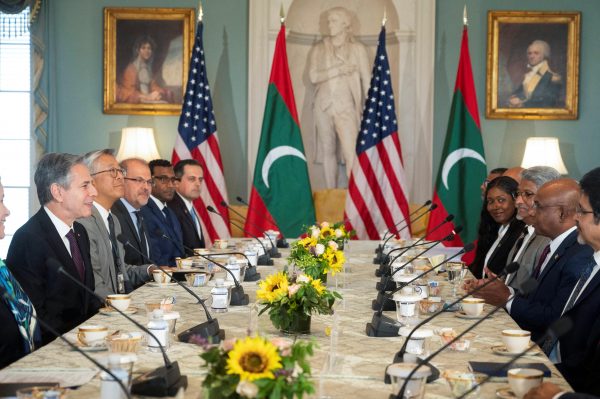It is not inaccurate to say that Maldivian President Ibrahim Mohamed Solih is likely to uphold Indo-Pacific partnerships because of his government’s close relationship with Delhi. But such an assessment is incomplete without considering what drives the Maldives’ interests and its recent regional security diplomacy.
The Maldives’ political environment creates opportunities for Indo-Pacific partners, including India, the United States and Australia, to enhance development and security partnerships that will support cooperation in governance, education, health, climate change and maritime security.
But this must be done with an understanding of the Maldives’ role in the Indo-Pacific, given the island nation’s ability to foster geopolitical and geoeconomic competition. The decision of former president Abdulla Yameen’s government between 2013–18 to align with China and remove the Maldives from Commonwealth membership drew significant attention in this respect.
The ramifications of the Maldives’ internal politics and foreign policy have forced Indo-Pacific partners like India, the United States and Australia to deepen their interest.
The election of Ibrahim Mohamed Solih’s government in 2018 saw the country support the ‘India-First’ policy and reinstate its Commonwealth membership. It also set aside key engagements with China that were not in line with the government’s strategic alignment with India. Other Indo-Pacific partners, particularly the United States, forged further engagements with the Maldives by signing a US–Maldives defence cooperation agreement in 2020.
Concerns remain that the island nation will abandon the rules-based order in the event of a negative election outcome for Solih, particularly if the Yameen-led Progressive Party of Maldives were to win. The latter could result in significant implications for the Maldives’ relationship with India and China, and hence Indo-Pacific partnerships.
Regardless of election results or the political views of competing political leaders, the Maldives’ growing involvement in regional security problem solving may also carry some weight in determining foreign policy. Regional dialogues and bilateral arrangements play a constitutive part in regional security cooperation, particularly in the Pacific islands context.
The Maldives’ engagements with India, the United States and Australia in development, governance and defence cooperation are a testament to this.
During a discussion about the Indian Ocean Rim Association, Foreign Minister of Maldives Abdulla Shahid commended India’s leadership in coordinating security policies in the Indo-Pacific region — highlighting the significance of this platform in fostering productive partnerships.
In this context, the Colombo Security Conclave brought together India and small regional states such as the Maldives, Sri Lanka, Bangladesh, Seychelles and Mauritius to address important security issues. India and the Maldives also engage in bilateral cooperation through the Defence Cooperation Dialogue and infrastructure building. In 2021, Delhi approved the opening of a new Consulate General of India, strategically located in Addu Atoll, to enhance their mutual security arrangements.
The importance of working with ‘like-minded people’ was underlined by Maldivian Defence Minister Mariya Didi when speaking about Maldives–India relations. Didi emphasised that the Maldives seeks to avoid being ‘indebted to any country in such a bad way that parts of our ports go to people we are unable to control’. With like-minded countries, security arrangements can be more transparent. The India–Maldives–Sri Lanka trilateral programme ‘DOSTI’ and the Colombo Security Conclave both have the potential to foster and strengthen such arrangements between the Maldives and regional actors.
The Maldives’ relationship with the United States is similar. Apart from a commitment to opening a US embassy in the Maldives, the framework for US–Maldives defence cooperation underlines the importance of mutual partnerships for supporting a free and open Indo-Pacific. In response to a comment by US Secretary of State Antony Blinken, Maldivian Foreign Minister Abdulla Shahid assured their mutual commitment to ‘a peaceful, prosperous, and free Indo-Pacific’ in June 2023.
Australia opened its first High Commission in the Maldives in May 2023. Generations of educational opportunities in Australia have created strong links between Maldivians and Australians. Deepening political engagement between the two countries will strengthen cooperation built on ‘shared aspirations … for a stable, secure and resilient Indo-Pacific’, according to the former minister of foreign affairs Marise Payne.
What China has to offer continues to have merit in terms of supporting the development agenda of the Maldives. China’s maritime expansion in the Indian Ocean region can create renewed links with the Maldives depending on the need for development cooperation.
Rather than seeing Maldivian foreign engagement through a China-centric perspective, understanding how political and development goals have pushed the government into contentious partnerships in the past gives insight into managing future cooperation. Understanding the Maldives’ national interests, such as development and climate security, is crucial for building collaborative regional security cooperation, as these areas drive policy.
Regional arrangements and dialogues create an institutional platform for the Maldives to build mutual regional security priorities. Indo-Pacific leaders can continue to engage with the Maldives to strengthen democratic practices and promote rules-based engagements.
Athaulla A Rasheed is PhD candidate at the Department of Pacific Affairs, The Australian National University.

